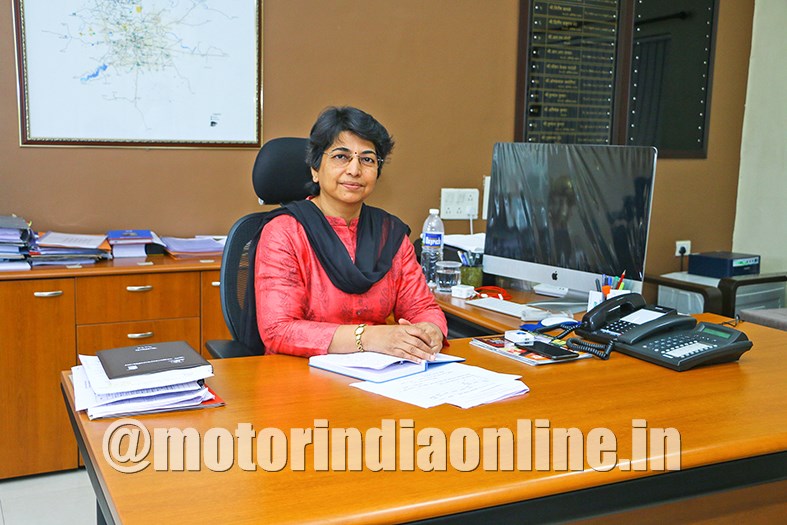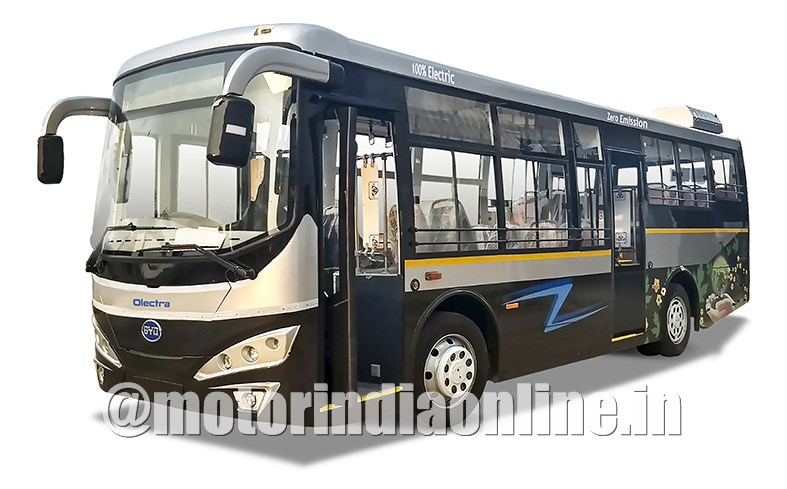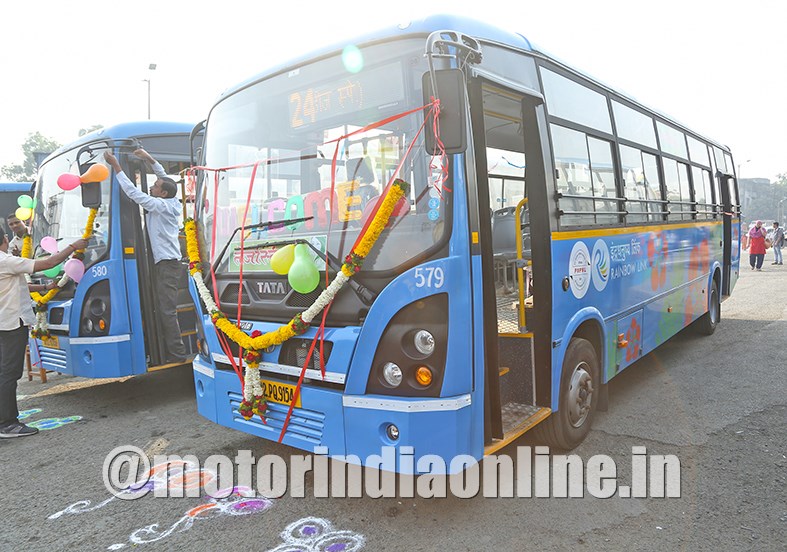Electric buses, CNG buses for dedicated BRTS corridors, free tickets for women on one day each month, generation of additional revenue through advertisements and other strategies are helping the Pune Mahanagar Parivahan Mahamandal Limited keep pace with the changing public mobility needs. In an exclusive interview with Chairman and Managing Director (CMD) Nayana Gunde, Rajesh Rajgor finds out PMPML’s unwavering commitment to operational efficiency for improving public transportation in the bustling and vibrant city of Pune.

One doesn’t need a PHD degree to understand that many cities in India have experienced spurt in development in the last 15 years. The aspirational young middle class have had better access to education, jobs and easy loans on instalments that has led to many Tier 1 and II towns in and around popular cities become urbanised. Cities like Bangalore, Surat, Chennai, Mumbai, Kolkata, Ahmedabad or Rajkot have all seen and experienced a huge rise in two-wheelers and passenger vehicles in the last decade and half. Pune, the neighbouring city of Mumbai, has similarly been influenced by this rapid growth.
Shedding light on Pune’s population and their use of vehicles, Nayana Gunde, CMD, Pune Mahanagar Parivahan Mahamandal (PMPML), says: “Pune is always referred to as a city of two-wheelers and cars. We have around 52 lakh vehicles on road out of which close to 75% are bikes and cars. Apart from the working population even the student community is into using two-wheelers and passenger cars. The share of public transport is merely 12%. Hence, we are taking steps in the right direction to turn them to use buses. It may look like an overly ambitious plan, but we need at least 50% of the 77 lakh people in Pune to use public transport by 2025.”
Expanding the fleet
Addressing the challenge, PMPML has set a roadmap to bolster their fleet size to 2,500 buses from the current 2,000 buses. The board of directors at PMPML passed a resolution to acquire 500 electric buses in the time period of two years, from 2019 to 2021. “The first tender was floated for 25 electric buses and on February 8 this year we got the first set of buses running on the road. These are 9-metre midi buses by Olectra. Since Pune also has 67 to 70 km of BRTS in operation today, the second tender was floated for BRTS-compliant 125 electric buses, out of which we have received 50 buses,” Gunde informs.
On March 8 this year, PMPML also started a free bus service for women commuters on a single day each month. “Being International Women’s Day, we dedicated 33 buses for women commuters. Pune has a working population of women to an extent of 27% in the organised sector alone. In order to encourage women to take up jobs and use public transport, we further decided to make the bus service free for them on the 8th of every month. Such has been the positive response that university or college girl students plan their camping and outdoor activities on the 8th of every month,” Gunde states.
In the non-peak hours between 11 am and 5 pm men are allowed to board the buses. This also ensures the operational efficiency of the fleet. PMPML has also floated and finalised an order for 400 BRTS (Bus Rapid Transit System)-compliant CNG buses from Tata Motors. “We have got 250 CNG buses on our roads and the rest should come by the end of October. While the procurement of 350 remaining e-buses happens, we have another tender for BRTS-compliant CNG buses under the GCC model,” Gunde reveals. Needless to mention, all these new buses are installed with passenger information system (PIS), charging points and comfortable seats. All the electric buses are also equipped with air-conditioning systems.
Effectiveness of operations
PMPML, which functions as an independent transport company, gets 60% of subsidies from the Pune Municipal Corporation (PMC) and 40% from the Pimpri Chinchwad Municipal Corporation (PCMC). It has a 10-member board of directors. Apart from Dr. Saurabh Rao, Municipal Commissioner PMC and Shravan Hardikar, Municipal Commissioner, PCMC, the board also has Captain Rajendra Patil, Director of CIRT, Pune and Ajit Shinde, Regional Transport Officer (RTO), Pune. Together they take the required decisions to expand the bus network of Pune. “We are planning to stretch the BRTS routes to 100 km from the current 67 km. We will have five new corridors open to the public this year itself. This will include major commercial routes like Nigdi-Dapodi, Swargate-Katraj and Kalewadi,” Gunde says.
About whether the ongoing metro project will deter PMPML’s vision and hamper their expansion plan for Pune, Gunde states: “Our expansion activity will not stop. In fact, some of our routes are complementing the metro routes and can be used by people as a feeder service to reach near their homes. The metro will only complement our vision for people to use more public transportation.” As far as the maintenance of their buses is concerned, most of the fast-moving and critical parts are sourced from OEMs. PMPML boasts of two well-functioning repair facilities, one at Swargate and another at Pimpri-Chinchwad that can carry out most of the repair work.
Maintenance and financials
“Up to 53% of our expenses include the salary of employees while 18% is spent on fuel and around 6% is scheduled for maintenance,” Gunde informs. They also have annual maintenance contracts for buses with alternate powertrains. In fact, for setting up charging stations for the electric buses, PMPML has been facilitated with land at Tri Nagar and the Pimpri-Chinchwad area. “Since the technology is new and even the standardisation with respect to charging sockets and batteries have not been achieved, we have asked Olectra to set up the charging stations. A midi bus of 9 metre length takes around two hours to get fully charged and the 12-metre bus takes around three hours and runs around 125 km in a single charge,” Gunde says.
“As per the electric vehicle policy of Maharashtra, if we charge at night from 10 pm to 6 am we get the power at a discounted rate. We have therefore scheduled our charging times accordingly,” she adds. While ensuring the sustainability of operations, it is also important that public transport is made affordable to the large masses for which it is being operated. On inquiring about fare pricing for such expensive electric buses, Gunde says, “The ticket prices as of today are at par with the diesel buses. The lowest ticket for a short-distance trip starts from Rs. 5 and the longest route goes up to Rs. 60.”
It is evident that the focus is largely on people’s affordability and hence the figures for PMPML’s turnover are not very encouraging. “As much as 23% of our revenue is subsidised by both the corporations. Losses for last year are already to the tune of Rs. 240 crore. Through advertisements and ticket fare we earned around Rs. 640 crore and our expenditure was approximately Rs. 880 crore,” Gunde informs. “In order to generate revenues and increase the topline, we are looking at advertisements that can be telecast on television monitors inside the buses, apart from the signboards at depots and on the buses. We expect to achieve Rs. 25 crore in income by adding digital infotainment tie-ups,” Gunde says.

